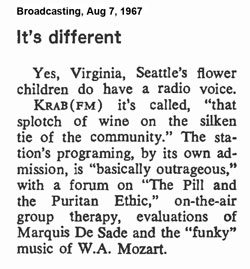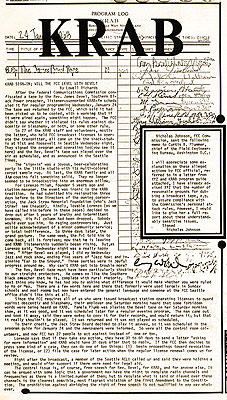Return to KRAB Audio Archives main menu
The KRAB Audio Archive
Lorenzo W Milam's Page
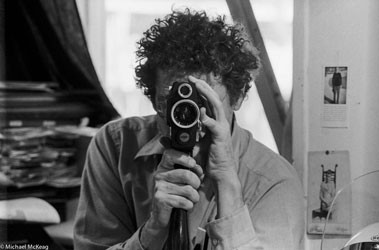
Lorenzo W Milam, cinematographer, on the houseboat (Point Blank by Michael McKeag)
(Click on image to open a larger version)
Featuring the voice, wit and wisdom of the one that started it all. Lorenzo reads from the Washington Teamster and plays music on Saturday morning; he interviews ethnomusicologist Robert Garfias, a psychologist, the guy who lives in his car, Captain Crunch, and others; he speaks to the National Federation of Community Broadcasters before they got their name; introduces the Reverend James Bevel; and is interviewed for Mike Wallace at Large.
The KRAB archive, of course, also has many examples of Lorenzo Milam's written work including articles in Puget Soundings 1964); program guide essays from 1963 to 1968 (Feb?); correspondence; FCC filings; Sex and Broadcasting (1975); and all the issues of RALPH (The Review of of Arts, Literature, Philosophy and the Humanities).
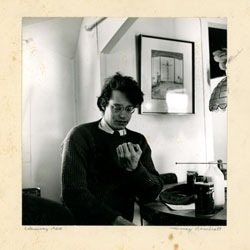
Lorenzo Milam, Feb 1968, by Mary Randlett, courtesy Nancy Keith
(Click on image to open a larger version)
NEW MAR 2021: Lorenzo and Duke on TV: The Hardwick Show - KTNT-TV, Tacoma Channel 11; Apr 14, 1965
In 2020, shortly after news of Lorenzo's passing traversed the inter-webs, we received an email offering to share a recording. It seems that in 2003 Glenn Austin was producing a radio documentary about the roots of community radio and contacted our hero. Though Lorenzo was then supposedly indifferent to his former radio projects, interestingly enough he still had something in his trunk, and was willing to give a copy to Glenn.
The files we received included what appears to be a digitized copy of a reel of tape from Apr 1965, with four distinct segments. First, we hear a KRAB announcer, who we believe to be Pat Sevringhaus Melgard, recorded on Apr 13, 1965 doing a station identification, a subscription pitch, and then a plug for an appearance by Lorenzo on "The Hardwick Show" on KTNT-TV in Tacoma to be aired the following night.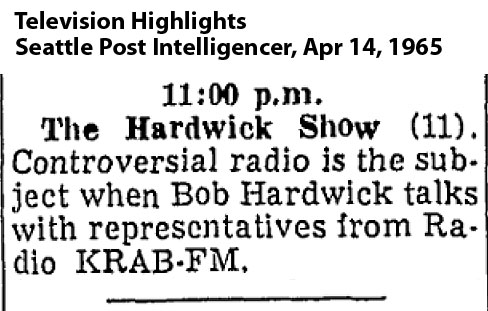
The second segment is the audio of the TV show itself, broadcast Apr 14, 1965. Lorenzo did not go to Tacoma alone, he was joined by Duke Hayduk, who was producing the morning program at this time. Both answered Hardwick's questions. "The Hardwick Show" on KTNT-TV was a relatively short lived late-night talk show. Bob Hardwick was a well known and popular morning program host on KVI in Seattle. Other Hardwick Shows were pre-recorded before a studio audience, and we believe it was likely that this one was too, but when exactly is unknown though probably a couple of days before airing.
The last two segments on what appears to have been a used and recycled reel of tape are incomplete, but still of interest: Number three is an example of a program series called "The Writer Speaks", this one featuring historian and writer Walter Starkie. The fourth is an excerpt from a commentary by (we believe) John Caughlan. Caughlan was a regular commentator, but this is the first recording we have found of him. "The Writer Speaks" may be found on the Spoken Word of the 1960's page, and John Caughlan on the Commentary page.
The Mar 24, 1965 program guide has the following message from Lorenzo:
AN EPITAPH FOR THE MORNING PROGRAM -
For two years, KRAB has been on the air mornings from 10 AM - 1 PM, repeating some of our best evening's programs and providing, in general, some intellectual life for the housewife. 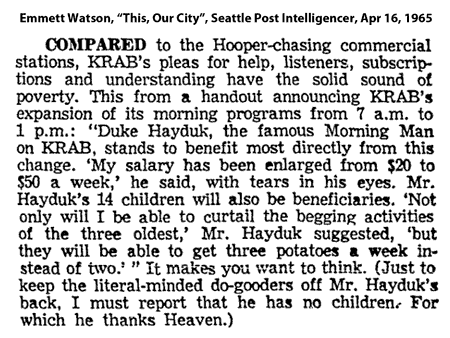 We have done this because we feel that other radio and television services treat her as if she were a catatonic idiot. We are fully aware of the possible stagnation of devoting one's conversation to three and five year olds. HOWEVER, the morning program costs us between $1000 and $1500 a year (salary and equipment wear), and our present Morning Man says he can no longer live on $20 a week. FOR THAT REASON, unless we can raise the $200*he needs to live on, the morning program, as of March 26, will be dead. What a pity.
We have done this because we feel that other radio and television services treat her as if she were a catatonic idiot. We are fully aware of the possible stagnation of devoting one's conversation to three and five year olds. HOWEVER, the morning program costs us between $1000 and $1500 a year (salary and equipment wear), and our present Morning Man says he can no longer live on $20 a week. FOR THAT REASON, unless we can raise the $200*he needs to live on, the morning program, as of March 26, will be dead. What a pity.
On Apr 16th the piece on the right written by Emmett Watson was published in his column "This, Our City" in the Seattle Post Intelligencer.
This is the earliest recording we have come across of Lorenzo expounding on the potential values of electronic media and the terrible waste perpetrated by the almost total commercialization of it.
![]() Listen now - "The Hardwick Show" - KRAB Apr 13 and KTNT-TV Apr 14, 1965 (26:54)
Listen now - "The Hardwick Show" - KRAB Apr 13 and KTNT-TV Apr 14, 1965 (26:54)
Recording courtesy Glenn Austin, ga0001
"Am I Really an Eichmann?" - KRAB Aug 29, 1966
"AM I REALLY AN EICHMANN ?" A dog and cat license inspector (anonymous) tells of his daily job, and how he pursues, attacks, and is attacked by his prey. Interviewed by Lorenzo Milam.
Last year Lorenzo forwarded an email he had received from a person seeking recordings for their archive (!). In his note to me, Lorenzo wrote "i think this guy may have some krab tapes --- esp my fave, the dog catcher one, which i crassly named, am i really an eichmann?".
Well, the fellow in Missouri didn't have anything new for us, but it turned out that KBOO had a copy they had received from the NFCB program distribution service back in the late 70's. And now we have it. NFCB had added an intro and outro with animal sounds, which we removed to restore it to its original state. We are also using the original program title, instead of the one created by someone else, "The Quality of Mercy".
 The tape label to the right gives a date recorded of May 26, 1967, but we know that is wrong. The interview first appeared with the title and description above in the Aug 1966 program guide. Perhaps it was broadcast in May 1967, but we cannot confirm, since that program guide is missing from the collection.
The tape label to the right gives a date recorded of May 26, 1967, but we know that is wrong. The interview first appeared with the title and description above in the Aug 1966 program guide. Perhaps it was broadcast in May 1967, but we cannot confirm, since that program guide is missing from the collection.
![]() Listen now - "Am I Really an Eichmann?" - KRAB Aug 29, 1966 (26:38)
Listen now - "Am I Really an Eichmann?" - KRAB Aug 29, 1966 (26:38)
Recording courtesy KBOO, Portland, bo0002
Letters and Things with Lorenzo Milam - KRAB Oct 26, 1966, Dec 2, 1980
Letters and Things with or wihout Zip code we read them all [10/26/1966]
The Promiscuous Dreamer - Baxophonic Sound (Channel Two). Paul Stanbery continues the cycle of Arnold Bax's lushly epic symphonies with his 2nd, Wallinford Riegger's 3rd and 4th, Bax's 5th, 6th and 7th, and Riegger's dissonant sets of Variations for Piano and Violin, both with orchestra.[Dec 2, 1980]
The first Letters and Things we can document was Wednesday Apr 10, 1963, described as " A mild discussion of the letters, problems, and ideas facing KRAB." In various forms and frequencies it went on for years. Typically, Letters and Things would include reading letters of complaint or complement from listeners, and news about the station. If there were no letters, and no news, the allotted time would be filled with fill music. In 1972, when manager Rick Maedler was doing everything in his power to get the station moved from the Doughnut Shop to the Firehouse, he increased the frequency to almost daily, trying to raise money, acquire building supplies, and generate enthusiasm for the new facility. Some version of the program continued until the very end.
Here is an example from Oct 26, 1966 in which Lorenzo Milam covers the FCC application for KBOO, the search for a KRAB correspondent in England, requests for sample program guides, and a big idea for a big party. This was rebroadcast Dec 2, 1980, when it seems the announcer neither knew or cared whom this Lorenzo fellow was, even though the program guide made it quite clear.
|
Following Letters and Things is a bit of fill music, and the beginning of Paul Stanbery's program, "Promiscuous Dreamer"
![]() Letters and Things with Lorenzo Milam - KRAB Oct 26, 1966, Dec 2, 1980 (31:40)
Letters and Things with Lorenzo Milam - KRAB Oct 26, 1966, Dec 2, 1980 (31:40)
Recording courtesy Brent Pelligrini, bp1061
Poets Charles Potts and Diane di Prima are interviewed by Lorenzo Milam - KRAB Mar 30, 1967
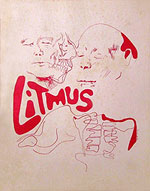 "There is an absolute truth" - A tempestuous interview on poetry with Chas Potts and Diane di Prima, who came to tell us about a new Seattle poetry magazine. "Litmus". [Mar 30, 1967]
"There is an absolute truth" - A tempestuous interview on poetry with Chas Potts and Diane di Prima, who came to tell us about a new Seattle poetry magazine. "Litmus". [Mar 30, 1967]
Interview on contemporary poetry. By popular request we repeat this interview from March in which Lorenzo Milam confronts poets Charles Potts, ed. of "Litmus" magazine, Diane de Prima, Ed and Elaine Smith on the forms and trends in modern poetry. [Aug 26, 1967]
Old poetry around here - not that old, just a few years ago, when a fellow named Charlie Potts, later known as Laughing Water in Berkeley, where he moved not long after this interview (keep it in mind when he talks about the Bay area), edited a magazine called Litmus, talks with Lorenzo Milam. Others present were Diane di Prima, Ed and Elaine Smith. From the KRAB archives. [Feb 19, 1971]
Charles Potts read selections of his poetry on KRAB the previous August (14), and had just released the second of issue of Litmus. Now here he was back at KRAB, with reinforcements, talking about his new magazine. Somewhat taken aback by Diane di Prima's assertiveness, Lorenzo plays the generation card.
Our copy of Litmus #3 came from the Id Bookstore. Here are slightly more recent interviews of Charles Potts by Paul E Nelson and of Diane di Prima by Jonah Raskin in SFGate.
![]() Poets Charles Potts and Diane di Prima are interviewed by Lorenzo Milam - KRAB Mar 30, 1967 (51:10)
Poets Charles Potts and Diane di Prima are interviewed by Lorenzo Milam - KRAB Mar 30, 1967 (51:10)
Recording courtesy University of Maryland Special Collections and University Archives, (NFCB collection), umd-bcast-072319
Mike Wallace at Large - Mike sends KIRO's Dick Harris to find out about An Unusual Radio Station in Seattle - Rec 1967; KIRO 1967; KRAB 1971;
This is sort of a novelty, alternately hilarious and infuriating. It reveals as much about the character and opinions of another broadcaster as it does about KRAB. Or maybe, with innocent benevolence looking out from KRAB's oasis in the vast wasteland, we just had no idea how judgmental and narrow minded the anti-intellectual flying squad could be.

Recorded sometime in 1967 before October, it was brought out occasionally for marathons, and was probably taped off the air by Dave Ingebright during the 1971 marathon. Below is how it is described in KRAB program guide nbr 124, Oct 1967:
KRAB ON NATION-WIDE RADIO.
KRAB will be the subject of a 6 - 8 minute interview on the CBS radio program "The Mike Wallace Show." We have been advised by Dick Harris of KIRO, who did the interview, that the program will be heard on all CBS radio stations sometime in October, on a Sunday. It will most probably be heard October 15th (Seattle time, 7:30 PM.) However, it may appear either before or after. The program was prompted by a scandalous article in "The Insiders' Newsletter," which giggled and snorted over KRAB's more sensational programs, and ignored the classical, ethnic, or Hopi music. Rumor has it that the magazine went out of business shortly after, which would serve them right, we think. KRAB was also mentioned in a recent Broadcasting Magazine, which called the station "the flower-power station," and described the operation as "the splotch of red wine on the white tie of an otherwise respectable community." Which is a pretty nice phrase, since we made it up. The articles resulted in a few puzzled letters from the wilds of North Dakota, Missouri, and Arkansas, asking for a further explanation, or offering some surrogate Hippy presentations which show a definite lack of contact with the reality we like to call Urban Life.
Our attitude towards the magazine newspapers could be described as supreme indifference, if it were not for the fact that we were livid with rage, and jumped up and down, and wrote tart letters--which we later threw away. KRAB has been so free of criticism from without that we tend to get pristine about the whole thing.
"The Insider's Newsletter" was published by Cowles Communications, Inc, which also owned Look, Family Circle and a number of other print publications, as well as TV in Des Moines (KRNT) and Memphis (WREC). So far, no examples of "TIN" have been located. Lorenzo may deny it, but he sometimes invents stories and exaggerates a bit. Not so here. Everything he says is true. Even more so today.
![]() Listen now - Mike Wallace at Large - An Unusual Radio Station in Seattle - Rec 1967 (10:23)
Listen now - Mike Wallace at Large - An Unusual Radio Station in Seattle - Rec 1967 (10:23)
Recording courtesy Dave Ingebright
Complete version Apr 2018: Mr Tremendous Interviewed by Gene Johnston and Lorenzo Milam - KRAB Apr 10, 1967
"JUST CALL ME MR. TREMENDOUS!" And he was: Charles E Jones travels about the country, giving salesmen belief in themselves - interviewed a bit sardonically by Gene Johnston.
This interview was aired on several occasions: Apr 10 and Jun 25, 1967, Apr 9, 1968, and Feb 1, 1982.
If you are curious, Charles (Charlie) "Tremendous" E Jones died in 2008. You can learn more about him here.
Originally, in Jun 2015, we posted an excerpt of this interview found in an aircheck from KFAT - formerly a Jeremy Lansman station in Gilroy, CA, just a little north of San Juan Bautista (famous for El Teatro Campesino and Vertigo). I wonder if some tapes from KTAO travelled from Los Gatos to Gilroy.
 Now we have the complete version.
Now we have the complete version.
Recording courtesy Jack Straw Foundation, JSF inv PA1068
Reverend James Bevel, and the Movement Against Political Suspensions - KRAB Dec 9, 1967, Jan 24, 1968
Note Oct 2015: In 2014, believing that the original "Bevel Tape" as broadcast on KRAB to be lost, I asked the Pacifica Radio Archives to digitize the copy in their collection, so it could be shared here. They complied and gave permission*. Now, one year later, a copy of the Original Bevel Tape has surfaced and we are excited to present it here. This is the Jan 24, 1968 version that begins with the introduction by Lorenzo Milam. This tape was rebroadcast during a marathon on Oct 10, 1971 with the following guide description:
THE BEVEL TAPE: Reverend James Bevel, Movement Against Political Suspensions - So titled for interesting reasons: this tape was first broadcast by KPFA in November of 1967, in a slightly edited version. It was sent to KRAB, where it was broadcast twice, late in 1967 and early in 1968. Reverend Bevel's language inspired a listener to complain to the F.C.C. Thus, when KRAB went before F.C.C. Hearing Examiner Ernest Nash in November of 1970 in a hearing concerning suitability of material for broadcast, THE Bevel Tape was one of the most important programs at issue. Eventually, the entire program was played during the hearing, in response to KRAB's contention that Reverend Bevel's remarks had to be heard as delivered, not just read.
We include this program in the Marathon not for sensationalism, or publicity value, but for the reason it was originally aired: Bevel is an incredibly fine speaker, and in this speech, his anger, frustration, and dedication are overpowering. As in 1968, the speech is preceded by an introduction by Lorenzo Milam. Those easily offended by language, or ideas, should try KBIQ for a while.
In 1967 student activists at both the University of California and San Francisco State University were finding themselves subject to suspension for participation in protest demonstrations on campuses. The students called these "political suspensions" and attempted to mobilize an organized "Movement Against Political Suspensions". In the Fall of 1967 students and faculty at Berkeley held a "teach-in" to discuss the issues and strategize actions. During the first half of the 1960's Reverend James Bevel served as the Southern Christian Leadership Conference's (SCLC) Director of Direct Action and Director of Nonviolent Education. In 1966 he spoke at Berkeley during a symposium about black power. Starting in 1967 he was an organizer of numerous demonstrations protesting the continuing war in Vietnam. Because of his background in both the struggle for civil rights and against the war, and his reputation as an articulate, rousing, speaker, he was invited to participate in the November 1967 teach-in.
-
Nov 17, 1967 - The teach-in was recorded by KPFA, at the UC Berkeley Pauley Ballroom;
-
Dec 9, 1967 - During Program Director Pam Plumb's Saturday morning program she played the Bevel speech as a preview of the program;
-
Dec 18, 1967 - FCC engineer/inspector Frank T Roach begins an investigation with a visit to KRAB, where he gets the program log of Dec 9, and confiscates the tape of the Bevel speech;
-
Dec 19, 1967 - Frank Roach returns with tape and conducts an inspection of station;
-
Dec 24, 1967 - Program is scheduled in guide, but broadcast is cancelled: Movement Against Political Suspensions - Reverend James Bevel of the Southern Leadership Conference, speaks at a teach-in at the Berkeley campus. KPFA (R);
-
Jan 24, 1968 - After a meeting of the Jack Straw Board of Directors, the program is rescheduled with this description: The James Bevel Tape. This program is discussed at great length on page 2 of this guide. It is the complete version as confiscated by the local office of the FCC on December 17, 1967. KPFA. (R)
Now that you have listened to the Reverend, read the full story of the FCC's reaction to this broadcast: FCC vs KRAB: The Adventure of the Short-term License Renewal - Part 3 - Reverend James Bevel and the Movement Against Political Suspensions
*Since an actual off-the-air recording of the Bevel Tape as broadcast on KRAB is now available, the recently digitized Pacifica version has been retired.
Recording courtesy Will Estill and Mark Apland, and the originator of the program, KPFA and the Pacifica Radio Archives, www.pacificaradioarchives.org
SIX YEARS OF KRAB, OR "STOP STANDING ON MY TIE, I THINK I AM GOING TO BE SICK" - Mar 15, 1968
5:30 PM - L W Milam, manager emeritus of KRAB, plays a hundred samples of talk, and music, and wonder that have been broadcast by the station since the wet, flapping days of Dec 1962, when the rattlebang, the whole mess went public. Sort of a sound montage with the voices of doom, despair, joy, angst; the musics of a world turned grey and old long before its time. Somewhere in all this, sandwiched between the sounds of Sunda, the 16th Century, and explications on Rock gardening in the Ukraine*, will be some sort of attempt at stating where the whole mess has been going. The juggernaut of time, racing down silver tracks, with slots of purple seal's fur, pushing eyes of white wonder into the fog spinning in inks turn from day to night, and back to day again. If, if, there is a day again. (until midnight)
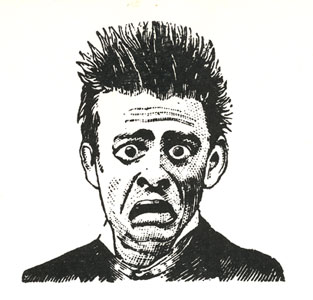
Repeated May 11, 1968, 10:00 AM: 6 YEARS AT KRAB OR WHOOPS I'M STILL HERE, "Lorenzo Milam takes over the Saturday morning show and oh yea bark"
As he prepared to leave gray Seattle for the sunny South, KRAB founder Lorenzo Milam assembled this bittersweet farewell to KRAB. A kind of swan song, in this seven hour montage he shared sounds unique to KRAB, and gave us a reminder of what he had in mind when he started the whole thing. All we have are tapes 6 and 7 - the last two-and-a-half hours from 9:30 pm to midnight. The rest is in the aether.
In response to pleas from readers and listeners, here are some clues as to what is included in this episode:
1 - All That Fall, Samuel Beckett's radio play (69:36) |
15 - Bob Fass (0.01) |
If you can identify any of the questionmarked items, please send us your ideas.
*I have searched unsuccessfully high and low, well, mostly low, for Rock Gardening in the Ukraine by Ignacio Schwartz. Can anyone suggest where a copy might be found? The Crimean unrest would seem to make it particularly poignant.
![]() Listen now - (After) Six Years of KRAB- Lorenzo shares some favorites (157:48)
Listen now - (After) Six Years of KRAB- Lorenzo shares some favorites (157:48)
Recording courtesy WYSO, and the KRAB Nebula
Being Mike Page - Lorenzo Milam speaks with the ex-psychotherapist - KRAB May 30, 1968
Conversation between Mike Page and Lorenzo Milam. "Mike is an ex-psychotherapist, with a lot of ideas his excollegues are uncomfortable with, while many others clamor to hear him. It looks as though radio has discovered a new, exciting personality right here in Seattle." so speaks Mike Page
Two days after this interview-conversation was broadcast KRAB aired its first (only) live group therapy marathon, described in the guide as follows:
Jun 1, 1968 (Saturday) 3:00pm - 20 HOUR GROUP THERAPY MARATHON - six people will be sitting across the street for twenty hours, alone & together. With nothing to talk about but themselves. Mike Page, who is an experienced, if disallusioned, psychotherapist will be coming out of retirement to conduct the session. An open time for all people to cry & learn & smile. Broadcast live....the session will end Sunday morning at 11:00
The guide editor probably meant "disillusioned", as the allusions flew fast during the session. "Across the street" was a house that the Jack Straw Memorial Foundation had recently purchased with the intent of eventually (when the transmitter moved to Cougar Mountain) remodeling and turning into KRAB studios and offices. (A couple of photographs of the scale model of Herb Hannum's design for the new facility can be found on the front and back covers of the Oct 10 to 17, 1971 Marathon program guide.) For the therapy session the wiring was precariously strung across Roosevelt to the control room where a tape delay of something like two seconds had been set up. Somehow I let myself be volunteered for the midnight to 6AM engineering shift, making station ID's on the hour while keeping my finger on the switch to cut the signal should the language drift into the forbidden zone.
Whatever became of Mike Page? About all I have been able to find, so far, are the Aug 26, 1991 minutes of the Island County Commissioners, in which Mike Page is appointed County Designated Mental Health Professional.
Recording courtesy the Pacifica Radio Archives
The Saturday Morning Show with Lorenzo Milam - KRAB Sep 14, 1968
Lorenzo Milam is back at the controls with baroque music or maybe flamenco and he tells me he's been reading some good things lately. Maybe he'll read some this morning.
[Editor's note: When I see references to "free form" radio (Lorenzo called it "Free Forum"), this is what comes to my mind.]
What you will hear (besides some long pauses):
Part 1 (43:01 )
1 - Henry Purcell - From the Second book of Trio Sonatas, violin – Giorgio Ciompi, Werner Torkanowsky; cello – George Koutzen; harpsichord – Herman Chessid
2 - Reading from the Wall Street Journal of Thursday Sep 12, 1968: "That auto you rent may have just had an exciting weekend" by Stanford Sesser
3 - Handel Suite #7 in G, Wanda Landowska, harpsichord
4 - Reading from Wall Street Journal of Aug 2nd 1968, "Confession Magazine Revenue Keeps Rising" by Kent McDougall
Part 2 (42:46)
1 - Francois Couperin - From Leçons De Ténèbres, Hugues Cuénod, Tenor; Gino Sinmberghi, Tenor; Franz Holetschek, Harpsichord and Organ; Richard Harand, Cello
2 - Lorenzo does a subscription pitch - He suggests that if the station was put for sale then, it would be reasonable to value it at about $100,000. Which is roughly $74,130,000 in 2020 dollars.
3 - J S Bach - Some 2 and 3 Part Inventions - Glenn Gould, piano
4 - And finally, it appears LWM is editing program guide essays for The Myrkin Papers, but a future book is loitering at the back of his mind because he identifies the work in progress he is reading from as "Sex and the Federal Communications Commission Fairness Doctrine".
If you go looking for the essays, the first was published in guide 81, Feb 9, 1966. Unfortunately, our copy is missing the first 2 pages. We are also missing guide 60, Apr 21, 1965, which is where the 2nd essay would be found. But do not despair, both essays can be found in The Myrkin Papers, which is available in the KRAB Archive. You just have to know where to look.
 Guides are valuable tools for finding information about the programs and people of KRAB. If you have any guides you are willing to have scanned for the archive, please email us at archive@krabarchive.com
Guides are valuable tools for finding information about the programs and people of KRAB. If you have any guides you are willing to have scanned for the archive, please email us at archive@krabarchive.com
![]() Listen now - The Saturday Morning Show with Lorenzo Milam - KRAB Sep 14, 1968 (85:47)
Listen now - The Saturday Morning Show with Lorenzo Milam - KRAB Sep 14, 1968 (85:47)
Recording courtesy Bob West, BW1068
Saturday Morning with Lorenzo Milam - KRAB Nov or Dec 1968
Although Lorenzo “retired” from his managerial role, he continued to volunteer at KRAB. He would read from a book or article, and play whatever music seemed to fit. This recording starts with the reading in progress of Claude Brown's "Manchild in the Promised Land". After a musical interlude, Lorenzo then reads from Ed Donahoe's column "Tilting the Windmill" in the Nov 29, 1968 Washington Teamster.
If I can get the money together, Gene Johnston did a six hour interview of Ed Donahoe in 1972, and it needs to be digitized.
![]() Listen now - Saturday Morning with Lorenzo Milam (63:06)
Listen now - Saturday Morning with Lorenzo Milam (63:06)
Recording courtesy Bob West
Saving the Old Seattle Armory - Lorenzo Milam talks with a couple of protesters - KRAB May 24, 1970 (rebroadcast)
Tonto and Lop-Lop protest the tearing down of the old armory, and Lorenzo W. Milam eggs them on.
 Can anyone identify Tonto and Lop-Lop, or can they be persuaded to come forward?
Can anyone identify Tonto and Lop-Lop, or can they be persuaded to come forward?
This was probably recorded some time in mid-1968, as that is when the "controversy" unfolded: "The City of Seattle agreed today to stopping demolition of the old National Guard Armory, Fred Bassetti, an architect, said." (Seattle Times Mar 11, 1968)
"The Armory is as remarkable an example of 19th Century Americana as the cannery or any of the buildings in the Ghiradelli development in San Francisco", wrote protesting architects in a letter to the Seattle City Council. The letter went on to say "Buildings like this have a unique character which could never be recreated and must be considered an environmental resource."
Recording courtesy of the Jack Straw Foundation, JSF inv PA0541
The Radio Letters AKA The WEAF Experiment, read by Lorenzo Milam - KTAO 1970; KRAB Aug 25, 1970
THE RADIO LETTERS - Lorenzo Milam reads from letters sent to WEAF (New York) and other Bell Telephone stations when they were conducting experiments in the transmission of music and talk . . . 1920 - 1923. Accompanied by music from Folkways Phono Cylinders Vol 1 and 2. From "The WEAF Experiment" by Banning. From KTAO.
In Jun 2017 the we received an email from Lorenzo: "There was a great tape I did in 1973 [sic] at ktao called the weaf experiment - - - a reading from the book of the same name of people @ radio 1922. I did the readings with appropriate scratchy music, and sent to jeremy and larry bolef at kdna and they added the kinds of intrafrequency weep & beeps aether noises typical of the time. It may have ended up at pacifica or in the kdna tapes . . . "
Eventually a copy of the program was found to be in the collection of tapes formerly exchanged by and among NFCB member stations and now in the Library of the University of Maryland. The WEAF Experiment was written by William Peck Banning a former AT&T Assistant Vice-President, and published in 1946.
With audio ambiance added by Jeremy Lansman and Larry Bolef of KDNA.
![]() Listen now - The Radio Letters AKA The WEAF Experiment - KTAO 1970; KRAB Aug 25, 1970 (30:03)
Listen now - The Radio Letters AKA The WEAF Experiment - KTAO 1970; KRAB Aug 25, 1970 (30:03)
Recording courtesy University of Maryland Special Collections and University Archives, (NFCB collection), bcast-072374
A visit to KTAO 95.3 FM radio station in Los Gatos (1971) - from the Bay Area Television Archive
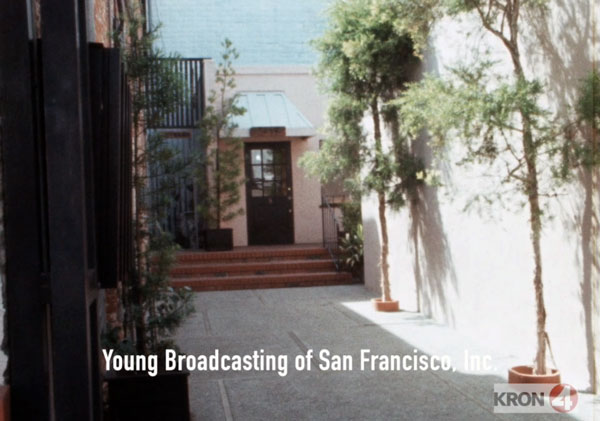
The entrance to KTAO, at 5 University Avenue, Los Gatos, CA
By 1970 Lorenzo, tired of gray and wet Seattle, had another station, in warm and sunny Los Gatos, California. If you look at the program guides you will see similarities to KRAB, but KTAO was, in a way, commercial. Lorenzo, of course, had his own ideas about what people buying airtime would get for their money, and he talks about them here. This short, but remarkable film was shot by KRON-TV on June 12, 1971. Two months later, in KTAO program guide #77 (Aug 1971), Lorenzo announces that he put "KTAO on the market last week", which would seem to contradict the upbeat tone of the film. He laments the lack of support (goodwill) KTAO received from the Los Gatos business community, then goes on to mention the KRON visit and recounts all the attention KTAO received from other Bay area media. At any rate, here he is wearing a KTAO visor and enthusiastically touting the dream.
Click on the photo above (KTAO's front door) to see the film.
Besides Lorenzo, who are the other people in the film? Thanks to Geoff Alexander, former KTAO volunteer, for sharing their names:
0:23 Lorenzo Milam
1:43 Bill Wade (KTAO guide 16: "Until Noon With The Baroque King . . . Bill Wade draws from KTAOs beautiful selection of L'Oiseau-Lyre, Telefunken, & Nonesuch records - and features, today, the compleat King Arthur by Henry Purcell.")
1:51 Jeff Smith joins Bill Wade (KTAO guide 31: "Jeff Smith, with interviews and music. Today, The Scripps Off-Campus Center, in Redwood City.")
1:57 Indi Higham joins Bill Wade (KTAO guide 60: "Indian Music. Three hours, with
Indi Higham. With readings.")
2:26 Lorenzo Milam
3:08 Jeff Smith and unidentified woman
3:29 Bill Wade
4:33 Jack Nicholson, KTAO station ID
5:05 Indi Higham
6:37 Lorenzo: “These are the golden days of radio, right now.”
Video courtesy Bay Area Television Archive, Copyright Young Broadcasting of San Francisco, Inc.
Note: See also page 117 of Sex and Broadcasting for "Secretary's notes on the meeting of the Tomentose Broadcasting Corporation and the Volunteers Association of KTAO, held March 2, 1971, on the back porch of the home of Ms. C. McGowan"
Let Sleeping Kaisers Lie - Rec 1969; KRAB Oct 11, 1971
Lorenzo Milam interviews John Daugert, who has lived in either a Kaiser or a Fraser for -the past 8 years. He talks about his fleet of Kaisers (he's owned fifteen) and why they were the best car made. the difficulties of sleeping in a car (he is also six foot three and weighs 220) and the various hassles, especially with the police, he has encountered living in his car.
This excerpt was found on an air check of KFAT (Gilroy), a station that Jeremy Lansman owned for a while. Someday, maybe, we will find a complete version.
![]() Listen now - Let Sleeping Kaisers Lie - KRAB Oct 11, 1971 (10:45)
Listen now - Let Sleeping Kaisers Lie - KRAB Oct 11, 1971 (10:45)
Recording courtesy of KFAT aircheck posted online
Professor Robert Garfias in Rhodesia - KRAB Dec 8, 1971
INTERVIEW: ROBERT GARFIAS - L W Milam talks with Mr Garfias about his recent trip to Africa (and several other places); about the political situation in Rhodesia and South Africa; and about the treatment of blacks in these countries as well as describing the music he was there to record. Robert Garfias is a professor of ethnomusicology at the University of Washington; he does a Wednesday night music show on KRAB called "Ethnic Music", heard every week at 9:00 pm, and repeated Thursday at 11:30 am.
For those puzzled by the program guide description above, Zimbabwe was once called Rhodesia. The death of Nelson Mandela makes some of the comments in this program all the more poignant. In addition to being KRAB's first Music Director, Robert Garfias founded the Ethnomusicology program at the University of Washington. With his guidance, KRAB became one of the few radio stations in the world to prominently feature the traditional and classical music of non-western cultures.
![]() Listen now - Robert Garfias interviewed by Lorenzo Milam (42:13)
Listen now - Robert Garfias interviewed by Lorenzo Milam (42:13)
Recording courtesy of the Jack Straw Foundation, JSF inv PA1070
For those unfamiliar with Mbira, here is a very short sample taken from Robert Garfias's field recordings made during the 1971 trip discussed in the above program. Mbira.org has released two CD's (numbers 1200 and 3020) of his recordings, as well as many other styles of Mbira. This excerpt is from "Njari 1971", recorded in Harare and performed by Alvoro Shiwoto and Enoch Kaute:
Please click here to go to Lorenzo Milam's interview of Captain Crunch
Milam Exposed – Keynote Address to 1976 NFCB Conference - KRAB Jun 1976
Lorenzo Milam delivering the keynote address at the first National Federation of Community Broadcasters conference in Telluride, Colorado, June 17, 1976.
![]() Listen now - Lorenzo Milam's keynote speech at the 1976 NFCB Conference (23:46)
Listen now - Lorenzo Milam's keynote speech at the 1976 NFCB Conference (23:46)
Recording courtesy Robert Weppner
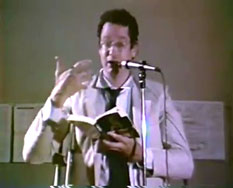 |
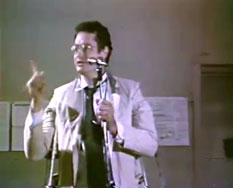 |
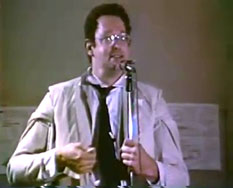 |
|---|
Photos from video by Thomas Lofstrom, from Telluride conference. The inspiration for David Byrne and Stop Making Sense?
In Memory of Lorenzo Milam - slideshow
Lorenzo W Milam passed away Jul 19, 2020. On Aug 15, 2020 an online "Zoom" wake/memorial/roast took place. It was organized by a very small group of friends and associates of Lorenzo, but approximately 150 people participated. There were about ten speakers in a program organized By Nan Ruben and Chuck Reinsch, after which some of the 150 people offered their tributes and memories. Some spoke and some didn't, but the event lasted about five and a half hours.
We want to thank the Prometheus Radio Project for letting us use their Zoom account; Pete Tridish for his assistance in organizing and technical support; Mike McKeag for technical support and assembling the slide show from a whole bunch of image files; and Nan Rubenfor her organizational skills and hosting the bulk of the event.
The first group of speakers were, in order, Jon Gallant who attended Haverford with Lorenzo and was a co-founder of KRAB and Jack Straw Memorial Foundation; Don Campau, a volunteer programmer at KTAO, who operated a record store on behalf of Lorenzo, and served on the Fessenden Board for years; Richard Malmed and Mimi Malmed who met Lorenzo in Mexico thirty years ago and became close friends (Richard was appointed by Lorenzo to be his literary agent); and Anna Johansson, former Director of Pina Palmera a rehabilitation and care center in Oaxaca for both disabled and able children - a project in which Lorenzo invested money, time and himself.
If you possess any souvenirs (program guides, tapes, or photos) or have a story about your experience with KRAB you are willing to share, please email archive@krabarchive.com
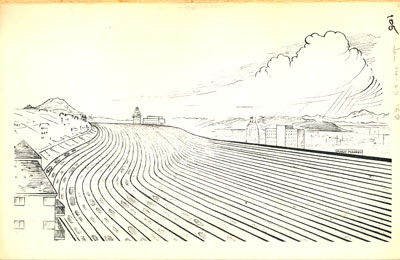 Cover of Guide 105, Jan 1967
Cover of Guide 105, Jan 1967